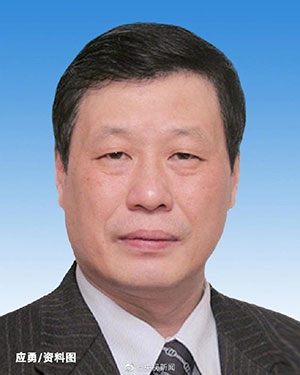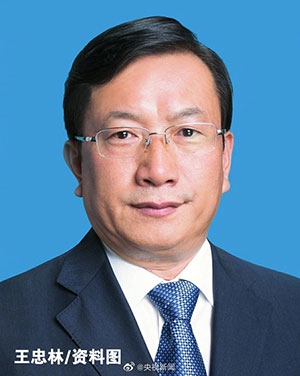


Ying Yong
China has reshuffled top officials in Central China's Hubei Province, the epicenter of the novel coronavirus pneumonia (COVID-19) outbreak, by appointing a new Party chief to the province and capital city of Wuhan with both having a background in legal affairs for years and considered as "firefighters" who is decisive in dealing with public health crisis.
Ying Yong was appointed secretary of the Hubei Provincial Committee of the Communist Party of China (CPC), replacing Jiang Chaoliang, according to a decision by the Central Committee of the CPC on Thursday.
Also, Wang Zhonglin, a member of the Standing Committee of Shandong Provincial Party Committee and Party Chief of Jinan, was named Wuhan's new Party chief, replacing Ma Guoqiang.
The official announcement of the major reshuffle came after a series of problems were exposed in the epidemic prevention and control work amid the CODIV-19 outbreak.
Since the outbreak, the central government sent an inspection group to guide the epidemic control work in Hubei, and a number of local officials have been questioned and punished for failing to fulfill their duties in the prevention and control work.
The central government also removed top officials from their posts amid the SARS outbreak between 2002 to 2003. From the first confirmed case reported on December 15 in 2002 in South China's Guangdong Province to an official announcement of the sacking of two ministerial-level officials -- former health minister Zhang Wenkang and former mayor of Beijing Meng Xuenong -- on April 20 in 2003, it took four months to reshuffle high-level officials amid the public health crisis.
The ongoing CODIV-19 outbreak also prompted a major reshuffle of top officials in the coronavirus epicenter Hubei, and it only took about two months to see that change since the first CODIV-19 case was reported on December 8, 2019, reflecting a quick response from the central government in dealing with a public health emergency.
Faced with the sudden CODIV-19 outbreak, problems such as sloppiness and poor management of work have been exposed among Wuhan and Hubei authorities, reflecting severe loopholes in local governance. The appointment of new officials will not only enhance prevention and control measures against the outbreak but also aim to highlight the urgency of improving crisis-handling capability among officials, analysts said.
Born in November 1957 in Xianju, East China's Zhejiang Province, Ying's previous work experience focuses largely in the public security, political and legal affairs sphere. He has been working in Shanghai since 2007 when he undertook the position as an official in the Shanghai High People's Court.
In his effort in combating the virus in Shanghai, Ying, also head of Shanghai's leading group for virus containment, emphasized grass-roots level units' strength in fighting the battle. He also conducted detailed and thorough discussion with people working in residential communities, hearing their opinions concerning the containment work.
He also underlined the role that science plays in this battle. Ying suggested Shanghai use its edge as a "scientific highland" to support the prevention and control of the virus. Speaking at a conference on Tuesday, Ying suggested scientific achievements should race against time, against virus, to gain initiative of fighting the coronavirus.
Ying received on-the-job college education and a Masters degree in law and the title of the national grade-two grand justice, according to his resume available online.
An anonymous Shanghai-based expert praised Shanghai's virus containment work. He told the Global Times that Shanghai, home to millions of migrant workers, could be the next epidemic center for the coronavirus.
However, with effective and scientific measures, which do not disturb people's normal life, Shanghai has managed to keep the infection at a moderate level compared with other provinces and municipalities. The city reported 311 confirmed cases of the CODIV-19 infection.
The expert attributed this to Shanghai's top-level officials' "modest nervousness" which means they did not panic when faced with the virus outbreak, but they also made urgent and scientific decisions based on data and professional knowledge of the epidemic.
Ying kept a clear mind at the early stage of the outbreak, said the expert, noting that Ying is also an official willing to take advice from other people.
In early February, Ying held a symposium in which he invited some officials who fought the SARS outbreak in Shanghai, in order to draw from their experience in fighting the new battle against the novel coronavirus, local media reported.
Ying was also reported as saying in late January after the virus broke out that "a non-sloppy government is one brave enough to face supervision; a government eager to make progress is one willing to accept criticism," in order to inspire residents to give advice on virus containment.

Wang Zhonglin
Born in 1962, Wang spent most of his career as a civil servant in East China's Shandong Province. After graduating from the department of criminal law in East China's University of Political Science and Law in early 1980s, he worked at the public security bureau in Zaozhuang, a city located about a two-hour drive from Jinan, the capital city of the province.
Wang was appointed as Party chief and director of Shandong Development and Reform Commission in 2015 and then became a member of the Standing Committee of Shandong Provincial Party Committee and Party chief of Jinan in 2018.
"He is very energetic, decisive and highly motivated, usually responding to questions very quickly," a former official close to the Shandong government told the Global Times. At such a crucial moment in fighting the disease, the appointment aims to allow the official to use his experience in dealing with problems.
In the fight against the outbreak in Shandong, Wang also served as the general commander in giving instructions to the prevention and control work in Jinan, and showed up at different public places including markets, residential areas, and railway stations without reminding local officials in advance, according to media reports.
He also required no one to accompany him and no briefing in the office but made an inspection in the field to guide prevention and control work.
Shandong's efforts in strengthening the prevention and control work while also ensuring agricultural production and export-driven business have been highly praised by the public as it set an example for provincial-level governance and crisis management capability amid the outbreak, according to analysts.
During the outbreak, the province also donated a large amount of food, vegetables, fruit and medical supplies to Hubei, which some netizens saw as a way of "moving home" to support the most severely coronavirus-hit area.
As of Monday, a medical team composing of 129 medical personnel from Shandong were dispatched to support Wuhan and Huanggang, another city hit by the outbreak, and in total 2,500 tons of fruit and vegetables have been donated to the region, media reports said.
"There has got to be someone in the local leadership to take responsibility for the current situation in Hubei," a resident in Wuhan surnamed Huang, who has been closely observing the outbreak in the city, told the Global Times.
Since the outbreak, more than 100 officials in Hubei have been held accountable for their incompetence in dealing with the prevention and control work, according to media reports.
Most recently, Zhang Jin, Party chief of the Hubei Provincial Health Commission, and Liu Yingzi, director of the committee, were both removed from office, China Central Television reported on Tuesday.
Also, on Tuesday, central government officials summoned those from Wuhan for talks, following the latest incident in which local officials failed to fulfill their duties when transferring a batch of coronavirus patients to a designated hospital.
 Fire brigade in Shanghai holds group wedding
Fire brigade in Shanghai holds group wedding Tourists enjoy ice sculptures in Datan Town, north China
Tourists enjoy ice sculptures in Datan Town, north China Sunset scenery of Dayan Pagoda in Xi'an
Sunset scenery of Dayan Pagoda in Xi'an Tourists have fun at scenic spot in Nanlong Town, NW China
Tourists have fun at scenic spot in Nanlong Town, NW China Harbin attracts tourists by making best use of ice in winter
Harbin attracts tourists by making best use of ice in winter In pics: FIS Alpine Ski Women's World Cup Slalom
In pics: FIS Alpine Ski Women's World Cup Slalom Black-necked cranes rest at reservoir in Lhunzhub County, Lhasa
Black-necked cranes rest at reservoir in Lhunzhub County, Lhasa China's FAST telescope will be available to foreign scientists in April
China's FAST telescope will be available to foreign scientists in April "She power" plays indispensable role in poverty alleviation
"She power" plays indispensable role in poverty alleviation Top 10 world news events of People's Daily in 2020
Top 10 world news events of People's Daily in 2020 Top 10 China news events of People's Daily in 2020
Top 10 China news events of People's Daily in 2020 Top 10 media buzzwords of 2020
Top 10 media buzzwords of 2020 Year-ender:10 major tourism stories of 2020
Year-ender:10 major tourism stories of 2020 No interference in Venezuelan issues
No interference in Venezuelan issues
 Biz prepares for trade spat
Biz prepares for trade spat
 Broadcasting Continent
Broadcasting Continent Australia wins Chinese CEOs as US loses
Australia wins Chinese CEOs as US loses